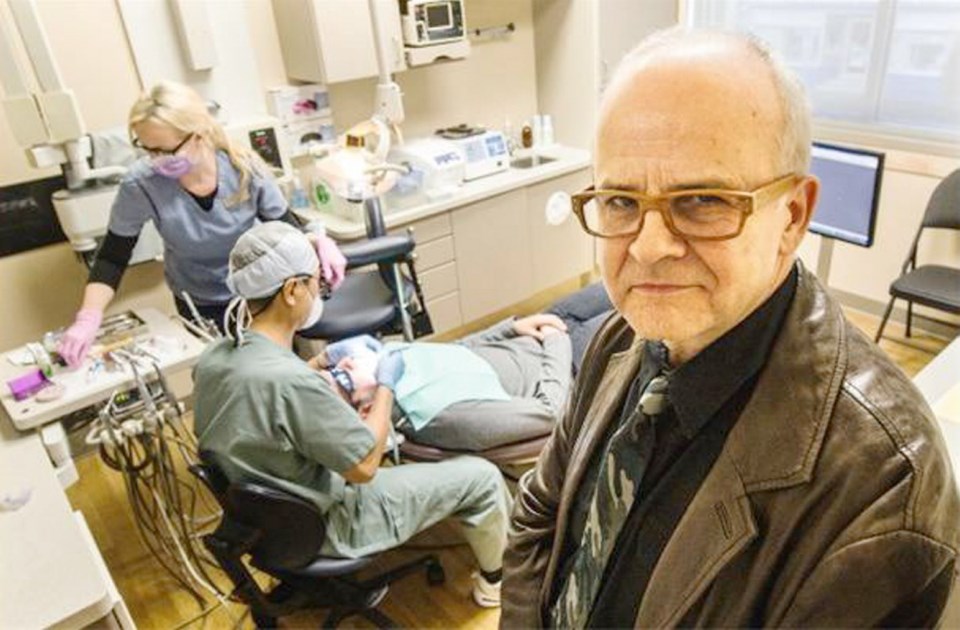VANCOUVER — Michael Flunkert gets pretty passionate when he talks about a rule that bars B.C. dentists from inspecting the teeth of their husbands and wives.
The Vancouver dentist calls the College of Dental Surgeons of B.C.’s policy a “draconian” restriction on freedom of choice, and once described the rule as “absurd, lacking in any degree of common sense, unfair to dentists and their spouses as a group, and … offensive,” in a letter to Premier Christy Clark.
But he’s far from the only dentist in B.C. to take issue with the policy.
“You cannot actually find anyone who agrees with this,” Flunkert told the Vancouver Sun.
The British Columbia Dental Association and the Chinese Canadian Dental Society of B.C. have both asked the college to loosen its rules around spouses to bring them in line with dental regulations in every other province and territory in Canada. And a handful of dentists have spent the last few years pushing for the change at a grassroots level.
Burnaby dentist Peter Kim has a particularly personal take on the issue. His wife is also a dentist and, until recently, he entrusted the health of his teeth to her.
“I have common sense, I know what I’m getting into, and now I can’t see my own dentist?” he said. “Why can’t I see the dentist of my choice?”
Soon, the restrictions might be tightened. The mouths of family members, friends or even business contacts could be practically off-limits for B.C. dentists as the college considers a new set of guidelines.
A draft policy called “Boundaries in the Practitioner-Patient Relationship” strongly cautions against treating anyone with whom a dentist has a close personal relationship. An earlier draft went further, strictly forbidding dentists from treating family and friends except in an emergency. The college rewrote the document after outcry from its members — particularly those in small, remote communities where almost everyone is a friend — but still says following the proposed guidelines would be “highly recommended.”
B.C.’s dental association has signed off on the proposed boundaries, but Flunkert and Kim still aren’t happy with the proposed limits on their practice.
“A lot of my patients have become my friends. So I can’t treat them anymore?” Kim asked.
While he believes tight restrictions might be appropriate for doctors and some other health- care workers, dentists have a long history of treating their family and friends.
“Physicians traditionally didn’t treat close family members. That’s not true for dentists,” Kim said.
In recent years, the only other jurisdiction in Canada that has had comparably strict policies is Ontario, under legislation that prohibited all health professionals from treating their spouses.
The ban was part of a zero-tolerance approach to sex with patients, and the consequences could be harsh: A chiropractor who treated his common-law partner, for example, was stripped of his licence for five years.
But the ban was loosened by the provincial legislature in 2013, giving each professional college the right to exempt spouses. Ontario’s dental college had been calling for the change for years, and moved quickly to revise its bylaws to allow dentists to treat their partners.
“They came to their senses — and now our college is losing theirs,” Flunkert said.
According to the College of Dental Surgeons of B.C., the stance on spouses became necessary after dentistry was taken under the umbrella of the provincial Health Professions Act in 2009.
The act requires colleges to create policies to counter sexual misconduct, and the college interprets that to mean any sexual relations between dentists and patients, spokeswoman Anita Wilks wrote in an email.
She said that there are no plans to create an exemption for treating spouses, but to date, no dentists have been disciplined for defying the policy.
Wilks said the new boundaries for treating family and friends are important for preventing conflicts of interest.
But when it comes to treating spouses, Health Ministry spokeswoman Angela Frattaroli rejected the college’s interpretation of provincial legislation: “If the college’s bylaws allow practitioners to treat spouses, then no, they would not be in violation of the Health Professions Act.”
More than 20 colleges are governed by the Health Professions Act — from doctors and nurses to opticians and physical therapists. The bylaws of those colleges differ significantly on the issue of treating husbands and wives.



